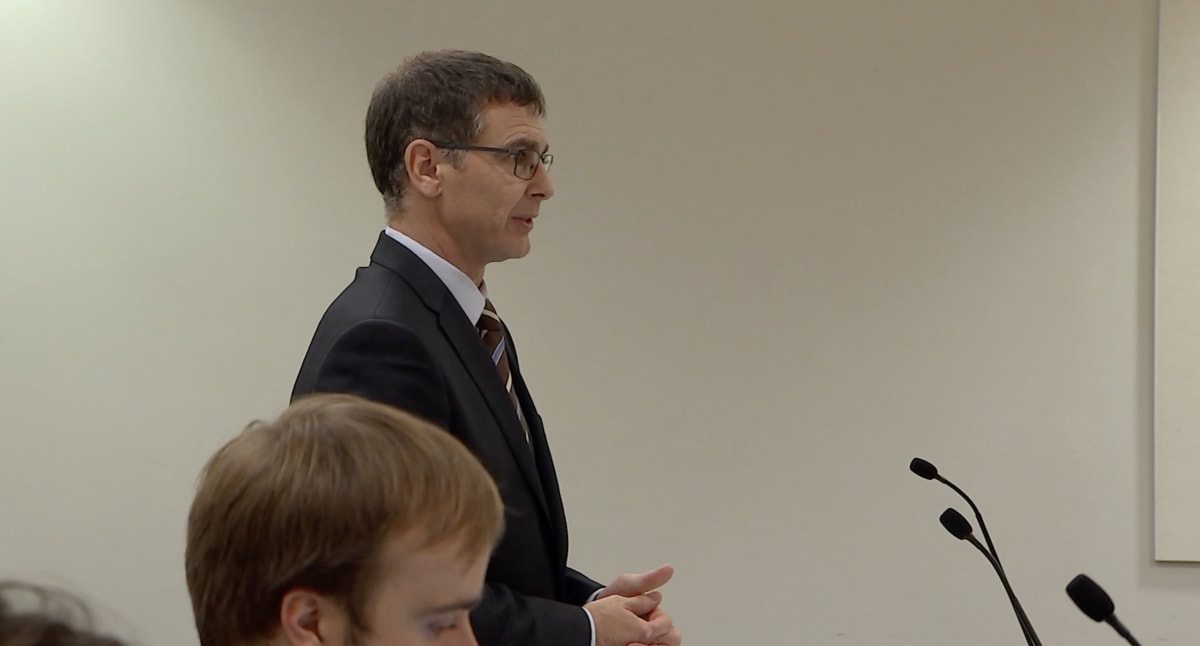Russell McVeagh Ex-Partner Admits Unsatisfactory Conduct For Bulk Of Charges
The interns & the law firm
Significant concessions come from a former law firm partner over allegations against him, as both sides make their closing statements in a disciplinary case with potentially far-reaching consequences
A former Russell McVeagh partner accused of groping summer clerks has admitted to unsatisfactory conduct regarding the majority of charges against him, following a hearing which could set a standard for sexual behaviour in the legal profession.
However, the man has retained his interim name suppression for the time being, due to concerns about the wellbeing of his partner.
The former partner is before the New Zealand Lawyers and Conveyancers Disciplinary Tribunal regarding seven charges of “misconduct or (alternatively) unsatisfactory conduct”.
The first five charges relate to his behaviour towards four summer clerks at an out-of-office Christmas function which took place in Wellington, while one involves consensual events with a fifth summer clerk (not testifying to the tribunal) at a “team” Christmas party held at the lawyer’s home.
Delivering his closing address for the standards committee on Friday, Dale La Hood said the partner had “opportunistically sought sexual affirmation, or at least inappropriate intimacy, from young junior female employees”, having been socialised to believe his behaviour was acceptable.
“In colloquial terms, he took liberties.”
The events in question, taken either individually or cumulatively, amounted to misconduct, while the man’s explanations about his conduct was neither credible nor reliable given his level of intoxication on the night and the broader evidence about his behaviour in the workplace.
The partner himself had spoken about modelling his behaviour on other senior lawyers whose personal lives were not exemplary, and that previous relationships between partners and staff had taken place without obvious consequences.
Start your day with
a curation of our top
stories in your inbox
Start your day with a curation of
our top stories in your inbox
“The submission is all that evidence is consistent with [the man’s] sexualised behaviour with and towards young female colleagues, that that is acceptable and normal behaviour.”
“These were very impressive young women, these witnesses: they gave impressive accounts, coherent, sensible, fair accounts of what happened to them … the way you’d expect any complainant telling the truth about them, I suggest, about what happened to come across.”
La Hood said the four complainants had given accounts of the night in question that were clear and consistent on the essential facts at play.
“These were very impressive young women, these witnesses: they gave impressive accounts, coherent, sensible, fair accounts of what happened to them…the way you’d expect any complainant telling the truth about them, I suggest, about what happened to come across.”
In contrast, the partner’s evidence had shifted over time, while in all likelihood he had no meaningful recollections of the night in question, but was simply reconstructing events in a way that minimised the gravity of his actions.
“It may be a natural human reaction but it’s simply one that you should reject in terms of credibility.”
He appeared to have misunderstood the relevance of his intentions to the claims, La Hood said, noting that in criminal law no sexual motive was required for a sexual crime.
“For an act that is inherently indecent, sexual motive is irrelevant. If you touch someone’s breast just because you felt like touching it, with no sexual gratification in mind, that is still indecent assault.”
His activity with the fifth summer clerk at his house, while consensual, involved a woman who was highly intoxicated, and in a clearly vulnerable position given the power imbalance between the two.
La Hood said he was not suggesting that any sexual activity between a senior and junior lawyer was inherently a disciplinary matter, and it was an area where it was “difficult to draw a bright line” – but that was not a relevant factor here given the particular circumstances of the case.

“Ultimately this was one of the most, if not the most, inherent power imbalance you can have.”
Even if the tribunal decided against striking off the man as a lawyer, that had to be the starting point for its considerations.
The partner’s lawyer, Julian Long, said in closing that while he would make the strongest case possible for his client, he accepted there was a “large middle ground” between his position and that of the standards committee where the tribunal could reasonably land.
“You didn’t need to sit through five days here for this to become abundantly clear … he has very very little to be proud of here.”
Long said the man had behaved “in a boorish and oafish manner” at the office Christmas party, and he accepted he had exceeded the personal boundaries of the summer clerks from almost the outset of the event.
However, he had given consistent evidence that he was trying to be festive and merry, and had the view that alcohol was the best way to make himself and others happy.
“His mood was merry, good and jovial but declining into an alcoholic stupor by the end of the evening.”
The partner acknowledged he had danced with the summer clerks, along with a number of other people, but did not accept any contact with the women’s breasts or bottoms had been done on purpose, “let alone for sexual gratification”.
However, Long admitted it was “difficult to resist the conclusion” of a finding of unsatisfactory conduct, at the least, regarding the charge where he touched the pelvis area of the first complainant and “nuzzled” into her.

The same went for the charge where he touched the breast of the second complainant and attempted to get into a taxi with her, and where he kissed the cheek of the fourth complainant and touched her bottom on the dance floor at the party.
The partner’s intimate kissing and touching with a fifth summer clerk at his house, while initiated by her according to his account, was also unsatisfactory by his own admission.
However, whether consensual but improper conduct with the woman should lead to a finding of misconduct depended on the facts and understanding of the relationship and the power imbalance.
The man had not orchestrated the situation so sexual conduct could occur, not did he imply any promise of preferential treatment, or conversely a threat of negative treatment.
“The occasion seems to have been very much spontaneous, that’s an important dynamic in what’s happening here … [but he] should never ever have allowed himself to get into that situation.”
Evidence about a misogynistic culture within the man’s team, and broader cultural concerns, should be given “little to no weight” by the tribunal as they were an unhelpful distraction from the specific charges being considered.
There was also a difference of opinion between the two sides over whether the man’s actions came while he was involved in “the provision of regulated services”, as was required for a finding of unsatisfactory conduct or misconduct under some parts of the relevant legislation.
“This is the first occasion this sort of issue has had to be looked at – we’re going to have to be very careful in the way we express ourselves as to where lines get drawn…there’s still the need for some care in not making it, not putting the standard too high.”
La Hood said the term had to be interpreted broadly to cover all activities incidental to legal work, as any other definition would leave “a nonsensical lacuna in the legislation”.
But Long argued the social events did not fall under that category, and noted the Law Society rules at the time had left a gap that was only remedied after the publicity around Russell McVeagh.
“If those rules are to apply, then at the very least some latitude should be afforded to the practitioner: I’m not saying very much, but you need to recognise that the discovery that these rules bite on this sort of conduct is something that the profession has not perhaps realised and was such that a report said, ‘We need to make this clear’, in many respects.”
Tribunal chairwoman Judge Dale Clarkson questioned whether the man’s interim name suppression should continue, given he had effectively admitted to four of the seven charges made against him.
Long said the only basis upon which the suppression had been requested was the wellbeing of his current partner, which remained a matter of concern, and he could not make a submission on its continuation until he had an update on her condition.
Tribunal member Paul Heath QC said the tribunal would need to be mindful about whether specific parts of the man’s actions, such as putting his hand on the waist of a summer clerk, would alone amount to a breach of conduct.
“This is the first occasion this sort of issue has had to be looked at – we’re going to have to be very careful in the way we express ourselves as to where lines get drawn … there’s still the need for some care in not making it, not putting the standard too high.”
La Hood agreed, but said the tribunal did not have to treat it as “a guideline case” and could rely on the specific context in its findings.
No timeframe has been set for either the tribunal’s findings or a final decision regarding name suppression.
Where to get help:
National Rape Crisis helpline: 0800 88 33 00
Safe to Talk national helpline 0800 044 334 or www.safetotalk.nz
Women’s Refuge (For women and children) – 0800 733 843.
Shine (For men and women) – free call 0508-744-633 between 9am and 11pm.
1737, Need to talk? Free call or text 1737 any time for mental health support from a trained counsellor
What’s Up – 0800 942 8787 (for 5–18 year olds). Phone counselling is available Monday to Friday, midday–11pm and weekends, 3pm–11pm. Online chat is available 7pm–10pm daily.
Kidsline – 0800 54 37 54 for people up to 18 years old. Open 24/7.
Youthline – 0800 376 633, free text 234, email [email protected], or find online chat and other support options here.
If you or someone else is in immediate danger call 111.





